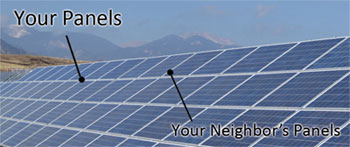California is about to get four important new laws; two on renewables and two on electric vehicles.
When California Governor Brown signs SB43, the state will have the first shared renewable energy program in the US, allowing everyone to get access: individuals, businesses, schools, cities and even the military.
The "Green Tariff Shared Renewables Program," allows people to buy shares in a solar, wind or other renewable energy project, and get credit on their utility bill as if it were on-site.
"S.B. 43 will allow the millions of Californians who cannot install their own solar unit, windmill, or other renewable power generation system to obtain renewable energy through their utility," says State Senator Lois Wolk (D-Davis), who sponsored the bill for the past two years. "The bill will create thousands of jobs and encourage more investment in an important sector of our state’s economy, while helping the state to meet its renewable energy goals."

It’s open to customers of the state’s biggest utilities: Pacific Gas and Electric Co. (PG&E), San Diego Gas & Electric Co. (SDG&E) and Southern California Edison Co. (SCE).
It is, however, capped at 600 megawatts (MW), about enough for 100,000 typical homes, and at least 100 MW must be available to residential customers and 100 MW must be built in disadvantaged communities.
Utilities will contract with renewable energy developers for the power and will manage the accounts of participating customers. Utilities dropped their opposition to the bill when these changes were inserted, along with the right to charge administrative fees to these customers.
Last year, community solar legislation failed in California because of lobbying efforts by PG&E.
The 600 MW developed under the legislation will not count toward California’s requirement that utilities get 33% of energy from renewables by 2020.
Colorado is the only state that has a Community Solar law, but there are pockets of interest in solar gardens across the country.
Solar Net-Metering Cap Disappears
Another bill, AB 327, gives utilities want they want in order to support eliminating the cap on net metering – they get to charge up to $10 a month for so-called Administrative fees in exchange for buying unlimited solar electricity from customers. It would start in 2016.
Solar installers recently formed the Alliance for Solar Choice to keep net-metering policies in tact against utility backlash across the country. Utilities see their business model as increasingly threatened by the growth of distributed energy.
The controversial fee, also being pushed in Arizona, is seen by many as a de-incentive for people to invest in solar.
It also allows the Public Utilities Commission to raise the amount of renewable energy utilities must buy from the current 33%, setting the stage for an expanded Renewable Portfolio Standard.
California’s utilities reached the goal of 20% renewables last year – way ahead of the 2020 deadline – so the state raised the target to an impressive 33% by 2020, which they are on track to meet.
Electric Vehicles Made Easier
One by one, barriers to people buying electric vehicles (EVs) are getting fewer. Under AB1092, all new multi-family homes, businesses, and shopping centers would have to include charging stations – a change inserted into the building code.
Most of the time people charge EVs at home overnight, but until now that’s not been possible for people that live in apartments or condos. The new law says at least 3% of parking spaces at multi-family buildings must have charging infrastructure and 10% at commercial buildings.
Another bill, SB454, would make using charging stations much easier because no membership or special card would be required and all fees will be disclosed.
"Can you imagine a scenario where you pull into a gas station and you don’t know whether or not it will take your credit card and you don’t know how much the gas is going to cost you?," asks Jay Friedland of Plug-in America.
Two of the biggest electric car charging networks are collaborating on this kind of open source network and the National Electrical Manufacturers Association is developing "interoperability billing standards" that will make using a charging station as easy an ATM machine.
Read "Model Rules for Shared Renewable Energy Programs":
